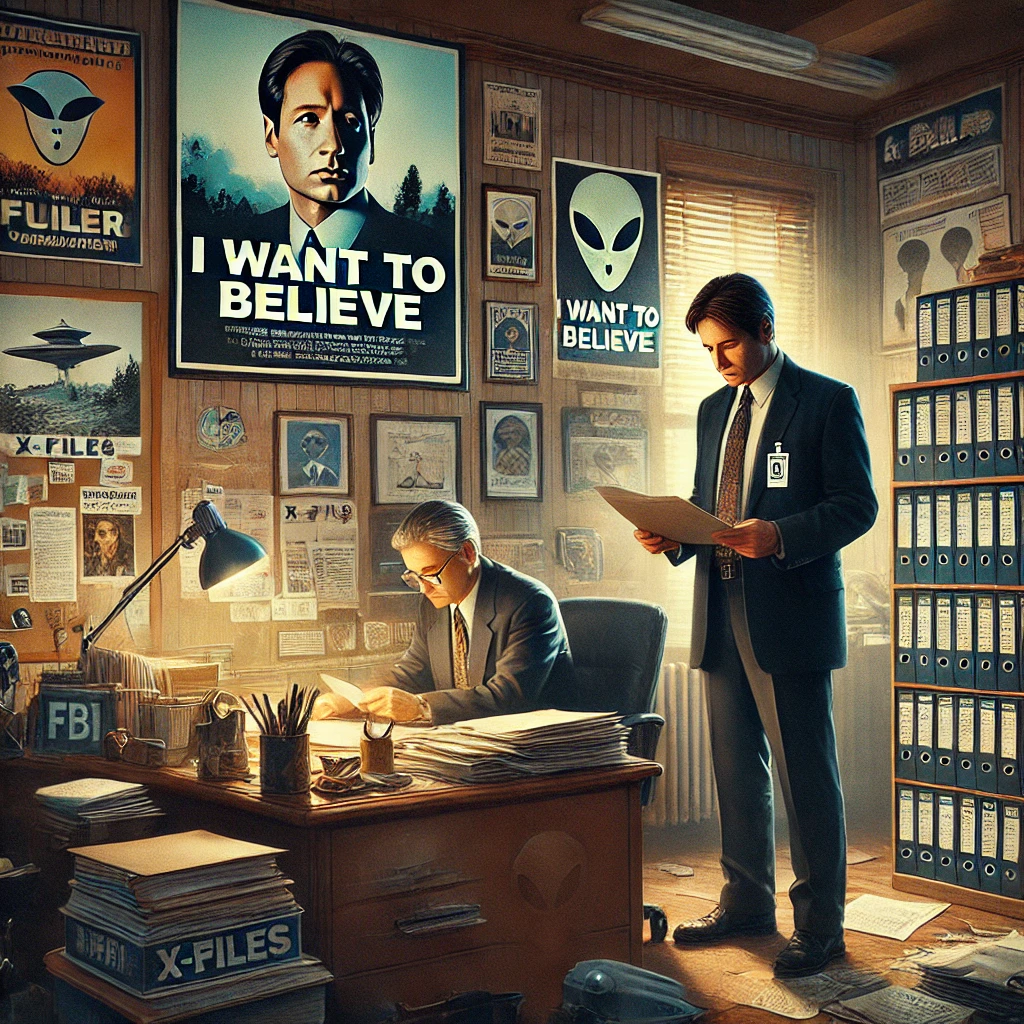On September 10th, 1993, a television show unlike any other debuted on Fox, captivating audiences with its blend of science fiction, horror, and conspiracy theories. The X-Files, created by Chris Carter and starring David Duchovny and Gillian Anderson, quickly became a cultural phenomenon, developing a massive cult following that would endure for decades. The show’s unique premise, compelling characters, and exploration of the unknown resonated deeply with viewers, making it one of the most influential television series of the 1990s and beyond.
The X-Files follows FBI agents Fox Mulder, played by David Duchovny, and Dana Scully, played by Gillian Anderson, as they investigate paranormal and unexplained phenomena. Mulder, a firm believer in the existence of extraterrestrial life and government conspiracies, is contrasted with Scully, a medical doctor and skeptic who approaches their cases with scientific rigor. This dynamic between belief and skepticism became the heart of the show, drawing viewers into a world where the line between reality and the supernatural was constantly blurred.
The Premise: Blending Science Fiction with Reality
The premise of The X-Files was both innovative and timely. In the early 1990s, interest in UFOs, government conspiracies, and the paranormal was at a peak, fueled by a combination of real-world events and popular culture. The X-Files tapped into this zeitgeist, offering viewers a show that combined the procedural elements of a detective series with the intrigue of science fiction. Each episode, or “monster-of-the-week,” typically presented a new case for Mulder and Scully to solve, ranging from alien abductions to genetic mutations and supernatural occurrences.
What set The X-Files apart from other shows was its overarching mythology—a complex, serialized storyline involving government cover-ups, alien colonization, and a shadowy cabal known as the Syndicate. This mythology, interwoven with standalone episodes, created a rich narrative that kept viewers coming back week after week. The show’s ability to balance episodic storytelling with a larger, ongoing narrative was groundbreaking for its time and would influence many television series that followed.

The Characters: Mulder and Scully
Central to the success of The X-Files were its lead characters, Fox Mulder and Dana Scully. David Duchovny’s portrayal of Mulder as a driven, often obsessive investigator with a deep personal connection to the paranormal—stemming from the mysterious disappearance of his sister—made him a compelling protagonist. Mulder’s relentless pursuit of the truth, no matter how outlandish it seemed, endeared him to fans who shared his fascination with the unknown.
Gillian Anderson’s Dana Scully, on the other hand, provided a necessary counterbalance to Mulder’s beliefs. Scully’s skepticism and reliance on science made her the rational voice in the duo, but over time, her character also evolved, experiencing her own encounters with the unexplained that challenged her worldview. Anderson’s portrayal of Scully was widely praised, and she became a feminist icon, representing a strong, intelligent woman in a field dominated by men.
The chemistry between Duchovny and Anderson was a significant factor in the show’s appeal. Their partnership, marked by mutual respect and a deep, often unspoken connection, became one of the most iconic relationships in television history. Fans were drawn not only to the mysteries they solved but also to the evolving dynamic between Mulder and Scully, which kept viewers invested in the show’s narrative.
The Impact on Popular Culture
The X-Files had a profound impact on popular culture, influencing not only television but also films, literature, and the broader media landscape. The show’s exploration of government conspiracies, secret experiments, and extraterrestrial life tapped into the growing public interest in these topics during the 1990s. Phrases like “The truth is out there” and “Trust no one” became cultural touchstones, reflecting the show’s themes of mistrust in authority and the search for hidden truths.
The series also paved the way for other science fiction and supernatural shows, such as Buffy the Vampire Slayer, Supernatural, and Fringe, which adopted similar narrative structures and themes. The X-Files demonstrated that there was a substantial audience for genre television that could blend episodic and serialized storytelling, inspiring a new wave of TV series that explored the fantastical and the mysterious.

The Cult Following and Fan Engagement
From its debut, The X-Files quickly developed a dedicated and passionate fan base. The show’s complex mythology and open-ended mysteries encouraged active engagement from viewers, who often speculated and debated about the show’s plot twists and hidden meanings. Online forums and fan websites dedicated to The X-Files flourished, with fans sharing theories, fan fiction, and detailed analyses of episodes. This level of fan engagement was relatively new at the time and demonstrated the show’s ability to connect deeply with its audience.
The show’s cult following extended beyond its original run, with fans continuing to celebrate The X-Files through conventions, fan art, and social media. The series’ influence on fan culture can still be seen today, as it helped to establish many of the practices and norms of online fandom that have become commonplace in the digital age.
The Legacy and Influence on Television
The legacy of The X-Files is significant and far-reaching. The show’s success demonstrated that genre television could achieve both critical acclaim and commercial success, paving the way for future science fiction and supernatural series. Its influence is evident in the structure of modern television, where long-running, serialized narratives have become the norm, and where shows often blend episodic content with overarching storylines.
The X-Files also pushed the boundaries of what was possible in television storytelling, particularly in its willingness to tackle controversial and provocative topics. The show’s exploration of conspiracy theories, government secrecy, and the possibility of extraterrestrial life resonated with audiences during a time of growing mistrust in institutions, and these themes continue to be relevant today.
The Show’s Revival and Continued Popularity
Even after its original run ended in 2002, The X-Files remained a beloved part of popular culture. The show was revived for two additional seasons in 2016 and 2018, bringing back Duchovny and Anderson as Mulder and Scully. These new seasons were met with both excitement and nostalgia from fans, as well as a renewed interest in the show’s themes of government conspiracy and the paranormal. The revival also introduced The X-Files to a new generation of viewers, further cementing its status as a cultural touchstone.
The continued popularity of The X-Files highlights the timeless appeal of its central themes and characters. The show’s exploration of the unknown, its questioning of authority, and its emphasis on the search for truth continue to resonate with audiences, making it a series that remains relevant in today’s media landscape.

The Cultural Significance of The X-Files
The X-Files is not just a television show; it is a cultural phenomenon that has left an indelible mark on popular culture. Its influence can be seen in the way it shaped the television landscape, inspiring countless other shows that explore the mysterious and the unexplained. The series also tapped into the cultural anxieties of its time, offering a narrative that reflected the growing mistrust of government and the enduring fascination with the possibility of extraterrestrial life.
The characters of Mulder and Scully, along with the show’s iconic catchphrases and imagery, have become ingrained in the collective consciousness, representing the ongoing quest for truth in a world full of uncertainties. The impact of The X-Files on television, popular culture, and fan engagement is a testament to its enduring legacy as one of the most important and influential shows in television history.
A Lasting Legacy
As we reflect on the debut of The X-Files and its subsequent rise to cult status, it is clear that the show’s legacy is both significant and enduring. The series not only entertained millions of viewers but also sparked conversations about science, the paranormal, and the limits of human knowledge. Its influence on television storytelling, fan culture, and popular media continues to be felt today.
The X-Files stands as a testament to the power of storytelling and the enduring appeal of the search for truth. Whether it’s through the iconic characters of Mulder and Scully, the show’s exploration of conspiracy theories, or its unforgettable tagline, “The truth is out there,” The X-Files remains a defining series in the history of television, one that will continue to captivate and inspire audiences for generations to come.
